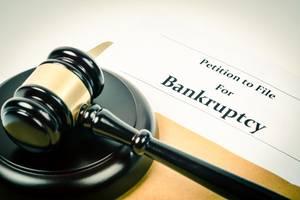How Is Disposable Income Determined in a Chapter 13 Bankruptcy?
 For those who are looking to obtain relief from their debts, bankruptcy is often the best solution. In a consumer bankruptcy, a person or married couple will generally have two options: Chapter 7 or Chapter 13. While Chapter 7 may be the preferred choice in certain situations, since it will allow for unsecured debts to be eliminated, some debtors may not qualify for this type of bankruptcy, or they may wish to avoid the loss of certain types of property. If a person will be filing for Chapter 13 bankruptcy, they will need to understand how their income and expenses will affect their case.
For those who are looking to obtain relief from their debts, bankruptcy is often the best solution. In a consumer bankruptcy, a person or married couple will generally have two options: Chapter 7 or Chapter 13. While Chapter 7 may be the preferred choice in certain situations, since it will allow for unsecured debts to be eliminated, some debtors may not qualify for this type of bankruptcy, or they may wish to avoid the loss of certain types of property. If a person will be filing for Chapter 13 bankruptcy, they will need to understand how their income and expenses will affect their case.
Creating a Chapter 13 Repayment Plan
In a Chapter 13 bankruptcy, a debtor will propose a plan in which they will make payments to the trustee in their case, and the trustee will apply the amounts paid toward the debts that are owed. The debtor will not be required to turn over any of the assets they own, and if they continue making payments toward secured debts such as a home mortgage, they will be able to avoid the foreclosure of their home or the repossession of other property. If the debtor’s income is below the median income in their state, their repayment plan will last for three years; otherwise, the plan will last for five years.
A debtor will be required to pay all of their disposable income toward their Chapter 13 repayment plan. Disposable income is calculated by taking the income a person earns and subtracting applicable expenses. Income includes a person’s wages and any bonuses, tips, or commissions they earn, as well as interest, dividends, or royalties they earn; income from a business or rental property; payments received through a pension plan or retirement account; spousal maintenance/alimony payments; and unemployment benefits. However, income does not include child support payments, Social Security benefits, or payments received from the federal government related to the COVID-19 pandemic.
Expenses that may be deducted from a person’s income include all costs necessary to support themselves and their dependents, including domestic support obligations. Charitable contributions totaling up to 15 percent of a person’s gross income may also be deducted. Other deductible expenses include:
-
Food
-
Clothing
-
Housing costs, including mortgage or rent payments and homeowner’s or renter’s insurance
-
Utilities
-
Vehicle-related expenses, including payments toward an auto loan or lease and operating expenses for ongoing vehicle maintenance and repairs
-
Public transportation expenses for those who do not own or lease a vehicle
-
Telephone services that are necessary for the health and welfare of family members or for a person’s job
-
Childcare expenses, including costs related to daycare, preschool, or babysitting
-
Federal, state, and local taxes, including income taxes, self-employment taxes, Social Security taxes, and Medicare taxes, minus the tax refunds a person is expected to receive
-
Involuntary payroll deductions, such as union dues, retirement contributions, and the costs of uniforms or supplies
-
Monthly health insurance premiums and out-of-pocket healthcare costs
-
Monthly life insurance premiums
After subtracting all applicable expenses, the amount remaining will be the disposable income that will be put toward a Chapter 13 repayment plan. If a person’s income changes after their repayment plan is put into effect, their disposable income may need to be recalculated, and the amount of their monthly payments may be adjusted.
Contact a United States Chapter 13 Bankruptcy Lawyer
When filing for Chapter 13 bankruptcy, determining what types of income and expenses should be considered can be a complex process. These calculations can be crucial to ensure that a person will be able to make ongoing payments while also covering their regular expenses. To ensure that these issues will be handled correctly, a debtor will want to work with a U.S. bankruptcy attorney who can answer their questions and guide them through the bankruptcy process.
Sources:
https://www.uscourts.gov/services-forms/bankruptcy/bankruptcy-basics/chapter-13-bankruptcy-basics
https://www.law.cornell.edu/uscode/text/11/1325
https://www.uscourts.gov/sites/default/files/b_22c-2_1214.pdf
















